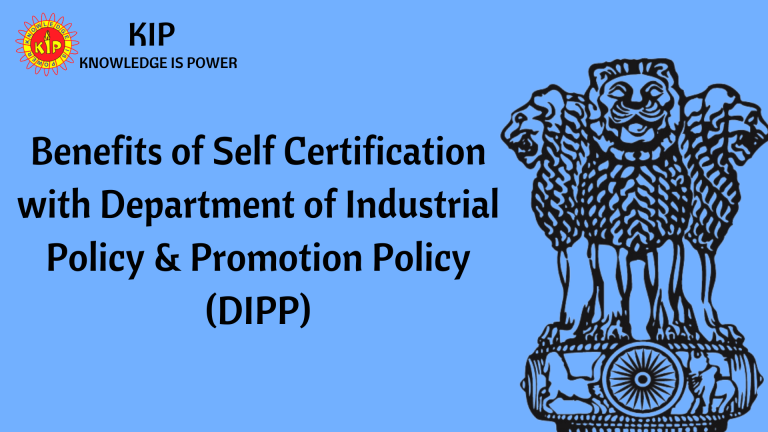- July 28, 2023
- admin
- 0 Comments
- Other
Self Certification with DIPP
Subscribe Free Business & Subsidy Update Plan And Get weekly Subsidy Updates

If you want to any subsidy then fill this form :- https://forms.gle/nu7cAbZr3VUZtGkF7
The Department of Industrial Policy & Promotion (DIPP) is responsible for formulation and implementation of promotional and developmental measures for growth of the industrial sector, keeping in view the national priorities and socio-economic objectives. It is responsible for the overall Industrial Policy.
Objectives of DIPP :
- To reduce the regulatory burden on start-ups, thereby allowing them to focus on their core business and keep compliance costs low.
- The Department is responsible for encouraging acquisition of technological capability in various sectors of the industry through liberal foreign technology collaboration regime.
- It plays an active role in investment promotion through dissemination of information on investment climate and opportunities in India and by advising prospective investors about licensing policy and procedures, foreign collaboration and import of capital goods etc.
- The Department is also responsible for Intellectual Property Rights relating to Patents, Designs, Trade Marks and Geographical Indication of Goods and oversees the initiative relating to their promotion and protection.
Benefits of Self Certification with DIPP :
1) Patent Application & IPR Application:
- Patent applications filed by startups shall be fast-tracked for examination so that their value can be realised sooner.
- Startups shall be provided an 80% rebate in filing of patents vis-a-vis other companies. This will help them pare costs in the crucial formative years
- A 50% rebate is given to every startup applying for a trademark application for Trademark Registration process for start-ups.
2) Tax Exemption Under section 80IAC:-
Eligible startups can be exempted from paying income tax for 3 consecutive financial years out of their first ten years since incorporation.
3) Exemption under section 56 of Income Tax Act:-
- Investments into eligible startups by listed companies with a net worth of more than INR 100 Crore or turnover more than INR 250 Crore shall be exempt under Section 56 (2) VIIB of Income Tax Act
- Investments into eligible Startups by Accredited Investors, Non-Residents, AIFs (Category I), & listed companies with a net worth more than 100 crores or turnover more than INR 250 Crore, shall be exempt under Section 56(2)(VIIB) of Income Tax Act
- Consideration of shares received by eligible startups shall be exempt upto an aggregate limit of INR 25 Crore
4) Easy winding up of Company:-
As per the Insolvency and Bankruptcy Code, 2016, startups with simple debt structures, or those meeting certain income specified criteria* can be wound up within 90 days of filing an application for insolvency.
5) Easy Public Procurement Norms:-
- DPIIT Recognized Startups can register on GeM as sellers and sell their products and services directly to Government entities.
- In order to promote startups, the Government shall exempt Startups in the manufacturing sector from the criteria of “prior experience/ turnover” without any compromise on the stated quality standards or technical parameters.
- DPIIT recognised startups have been exempted from submitting Earnest Money Deposit (EMD) or bid security while filling government tenders.
6) Self-Certification;-
- Start-ups shall be allowed to be self-certify compliance for 6 Labour Laws and 3 Environmental Laws through a simple online procedure.
Labour Laws includes :
The Building and Other Constructions Workers’ (Regulation of Employment & Conditions of Service) Act, 1996
The Inter-State Migrant Workmen (Regulation of Employment & Conditions of Service) Act, 1979
The Payment of Gratuity Act, 1972
The Contract Labour (Regulation and Abolition) Act, 1970
The Employees’ Provident Funds and Miscellaneous Provisions Act, 1952
The Employees’ State Insurance Act, 1948
Environmental Laws includes :
The Water (Prevention & Control of Pollution) Act, 1974
The Water (Prevention & Control of Pollution) Cess (Amendment) Act, 2003
The Air (Prevention & Control of Pollution) Act, 1981
Eligibility for DPIIT start-up recognition:
- Period of existence and operations should not be exceeding 10 years from the Date of Incorporation.
- Incorporated as a Private Limited Company, a Registered Partnership Firm or a Limited Liability Partnership.
- Should have an annual turnover not exceeding Rs.100 crore for any of the financial years since its Incorporation.
- Entity should not have been formed by splitting up or reconstructing an already existing business.
- Should work towards development or improvement of a product, process or service and/or have scalable business model with high potential for creation of wealth & employment.
So, if you want to reduce the regulatory burden. Then, register & self-certify with DIPP.
For, more information you are requested to contact our KIP subsidy helpline on Mail – sales@kipfinancial.com and contact Number– +918683898080
Join us on Social Media-
Facebook Page- https://www.facebook.com/KIPFINANCIAL
Facebook Group- https://www.facebook.com/groups/kipfinancial
YouTube- https://www.youtube.com/channel/UCIFJyauYY2eTcqmrsT_R6sA?sub_confirmation=1
KIP Financial Consultancy Pvt. Ltd.
DSB – 38, Red Square Market, Hisar – 125001 (HR)



Leave a Comment